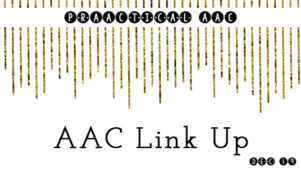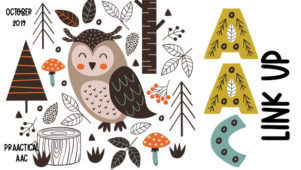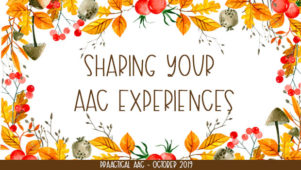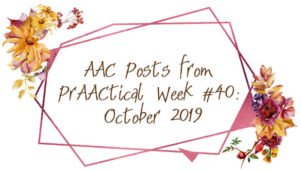Crowdsourcing AAC “Better” Practices: The AAC Agreements
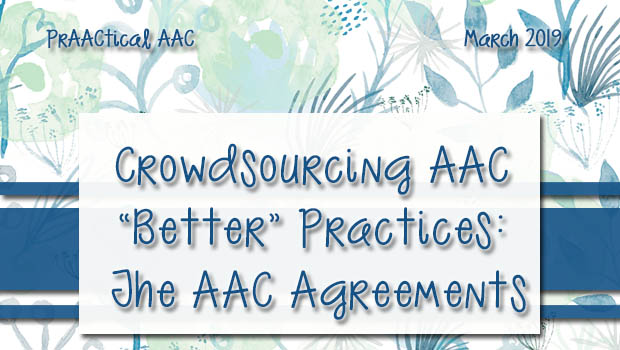
What would happen if a group of dedicated AAC stakeholders could come together around the idea of improving AAC services? Today’s guest authors, Chris Bugaj, Chris CichoskiKelly, and Shaun Pearson set out to explore issues around AAC practices and are inviting us all to join in the conversation. Let’s see where this takes us!
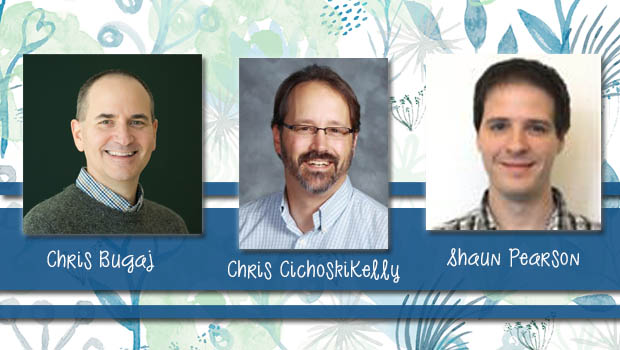
::::::::::::::::::::::::::::::::::::::::::::::::::::::::::::::::::::::::::::::::::::::::::::::::::::::::::::::::::::::::::::::::::::
The Genesis of the AAC Agreements
In 2016, Chris CichoskiKelly went to the Assistive Technology Industry Association (ATIA) conference with a question: what are the best practices for AAC implementation? He saw a lot of great talks on AAC but found little in the way of common ground or agreement amongst them. One of those sessions was co-presented by Chris Bugaj. After the session, the two Chris’s got to talking about the differences. An idea emerged. Given all the difference, what would be the similarities? If all those invested in AAC got together in one place, what might everyone agree upon? The question sparked another idea: let’s take it to the people! It just so happened that ATIA was hosting an EdCamp the next day, which would be the perfect venue for such a discussion.
EdCamp is a participant-driven “un-conference”. Participants are encouraged to put their suggested topics on a bulletin board and then facilitate the discussion. There are no “experts”, only people looking to engage in conversation and share their experiences. This was exactly what Chris C wanted! Could a group of people from around the world come together, share their experiences on the front lines, and develop a list of “better” common practices? What principles would everyone consider to be universal truths with regard to AAC consideration and implementation? That Friday night, after a long day of conferencing,, approximately 20 dedicated individuals participated in a session where they generated a list of twelve statements known as the “AAC Agreements” (https://padlet.com/cichoskikelly/aacagreements). At the end of the session, another question lingered. How many more agreements might exist if the participants had more time?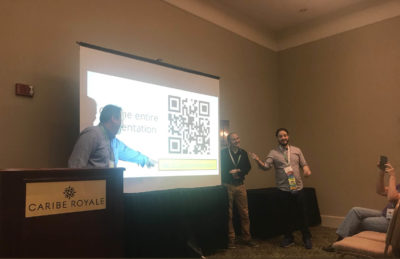
On The Shoulders of Giants: Acknowledging What’s Come Before
The facilitators of the Agreements acknowledge that a similar effort has taken place prior to the Edcamp event at ATIA 2016. Similarities have been noted between the AAC Agreements project and the NJC Communication Bill of Rights (BoR). The BoR has, rightfully, guided the practice of educators and therapists for well over 20 years, and will continue to do so in the future. It is an extremely important document meant to advocate for individuals with communication difficulties. The AAC Agreements differ from the BoR in that they are specific to practices centered around the consideration and implementation of AAC; generated from a crowd-sourcing effort, and are intended to be fluid and changing over time as the base of knowledge surrounding AAC grows and evolves.
The Continuation of the AAC Agreements
Two years later, the session was repeated at the Edcamp at ATIA 2018 with Chris C and Shaun Pearson acting as facilitators. Discussion centered not only around establishing new Agreements, but also coming to a consensus as to the wording of previous agreements. The following is what emerged from the 2018 ATIA EdCamp: https://padlet.com/cichoskikelly/aacagreements2018. Again, the question of how many more Agreements might be uncovered if the participants were not constrained by time persisted.
In 2019, Chris B, Chris C, and Shaun all facilitated an ‘AAC Agreements’ discussion at the ATIA Edcamp. What was unique about this particular discussion was that a large majority of the group elected to miss other Edcamp sessions and remained engaged in the task of generating additional Agreements for the entire evening. The following agreements were added to the list thanks to the participants present: https://padlet.com/cichoskikelly/aacagreements2019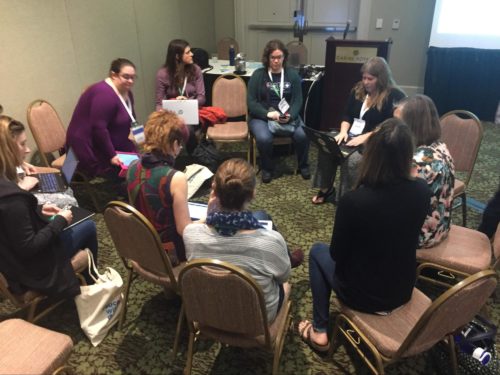
Organizing the AAC Agreements
All of the Agreements were placed on a Google Site for ease of access. Ideally, the AAC Agreements should be supported by research. However, some Agreements were born out of clinical experience and practice begging for research to support or reject their application. In a field as (comparatively) young as AAC, there are bound to be areas in which research is still lacking (despite there being support/evidence in clinical practice). For this reason, the Agreements were organized into two groups; Agreements Supported By Research and Agreements Supported by Practice. You can read the Agreements by going to the AAC Agreements Clearinghouse.
What’s Next For The AAC Agreements: Your Call To Action!
Part of the mission of the AAC Agreements project is to give people an opportunity to share their knowledge and experience, by appending additional research to the existing Agreements. Further, it is hoped that the AAC Agreements will inspire researchers to investigate topics that currently lack empirical evidence.
Following EdCamp, Chris C, Chris B, and Shaun facilitated an interactive presentation at ATIA 2019. Approximately 35 participants turned out on a Saturday morning to discuss the website, how to determine new Agreements, how to share the Agreements, how to invite others to add research and to help determine next steps to continue the discussion beyond an annual event at ATIA.
So, what does the future hold for the AAC Agreements? Well… you! The AAC Agreements are completely crowd-sourced. Do you want to help shape the AAC Agreements? You can!
- Visit the AAC Agreements Clearinghouse where you can contribute research, propose new Agreements and share your experiences!
- Join the Next Steps Working Group by filling out this Google form to indicate your interest!
- Contact the original facilitators at AACAgreements@gmail.com.
- Consider facilitating a presentation at a local, regional, state, provincial, national, or international conference!
In conclusion, over the last four years numerous professional working and living in the world of AAC practice have come together to brainstorm common ground upon which we all agree. You’re invited to join that discussion, add your insights and expertise, and get involved! Together, we can find better ways to move toward a day where every person has tools and the support to be the best communicator he or she can be. And, that, is something upon which we can all agree!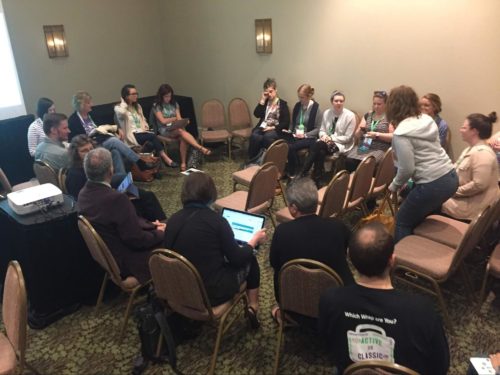
—————————————————————————————————
About the Guest Authors
Chris Bugaj (@attipcast): Christopher R. Bugaj is a founding member the Assistive Technology Team for Loudoun County Public Schools in Virginia, the author of The New Assistive Tech: Make Learning Awesome For All, and co-host of the Talking With Tech podcast.
Shaun Pearson (@shaun_slp): Shaun is a Speech-Language Pathologist practicing in Calgary, Alberta, Canada for Renfrew Educational Services. He currently works as an Assistive Technology therapist supporting students with complex communication needs ages 5-21. Shaun’s primary focus is to foster relationships and build capacity with other therapists, teachers, classroom staffs, and families.
Chris CichoskiKelly (@cichoskikelly): Chris CichoskiKelly is a Technology Integration Specialist for the Essex Westford School District (EWSD) in Vermont and has been working with students with disabilities, their families and educators for over fifteen years. Chris’ passion is teaching faculty and students about technology in education to help motivate students and to allow all students to show what they know.
Filed under: Featured Posts, PrAACtical Thinking
Tagged With: AAC Agreements, ATIA
This post was written by Carole Zangari

